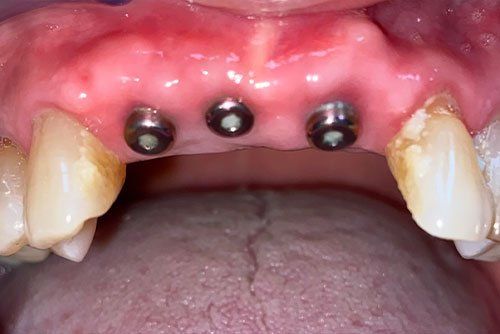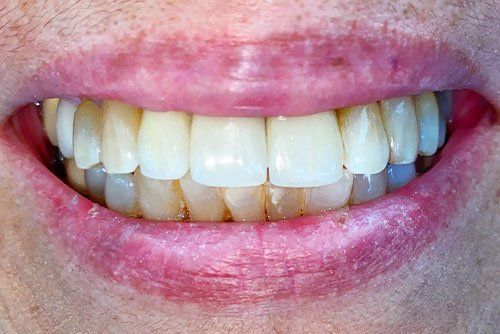Dental Implants in Cincinnati, OH
An alternative to bridges and dentures—dental implants are permanent replacement teeth placed directly into the jawbone. They look, feel, and function just like regular teeth and help you avoid problems associated with missing teeth, such as impacted self-esteem, malnutrition, bone loss, and difficulty speaking. If you have lost one or more natural teeth, this permanent replacement option may be for you. To learn more about dental implants in Cincinnati, schedule a consultation with Blue Ash Dental.
Types of Dental Implants
The American Academy of Implant Dentistry distinguishes between two types of dental implants: endosteal and subperiosteal. Endosteal implants are made of titanium and look like tiny screws, which are typically embedded directly in the patient's jawbone. Meanwhile, subperiosteal implants can be used even when a patient's jawbone has deteriorated. These implants allow placement above or on the jawbone beneath the gum.
Candidates for Dental Implants
According to the Mayo Clinic, the dental implants procedure could be safe and effective for you if:
- You do not smoke tobacco.
- You have lost teeth and want to improve your speech, nutrition, or appearance.
- You cannot wear dentures or find that they irritate your mouth.
- You are willing to return for several months of follow-up appointments as your jaw heals.
- You do not have any medical problems that can compromise the ability of the bones to heal.
- Your gums and soft tissue are healthy.
- You have enough healthy bone in your jaw to support the titanium implant fixture, or you are willing to commit to a bone graft if your doctor recommends it before moving forward.
- You have reached adult development and have all your adult teeth.
Get Life-Changing Results at Blue Ash Dental Group
Reasons To Choose Dental Implants
- When patients receive dental implants from a professional dental practitioner, they have a very high success rate. In fact, this type of surgery has been used in the United States for more than three decades.
- Many people with extensive tooth loss who have tried dentures find that it feels uncomfortable and slides around when they eat or talk. Dental implant treatment can make this issue a problem of the past.
- Dental implants from experienced dentists are associated with few complications. While you may notice some tenderness, soreness, or bruising at the implant site, these side effects usually resolve in a day or two.
What To Expect During Dental Implant Surgery
If you are a candidate for dental implants, we'll start by working with you to develop a treatment plan that addresses your aesthetic and oral health concerns. As specialists in restorative dentistry, we strive to preserve as much of your natural smile as possible and provide implant treatment that limits further tooth loss. During the consultation, we'll review your oral health with a comprehensive exam and take a full health history to make sure this choice is safe and will benefit you.
If you decide to move forward with this procedure, we first prepare the implant site by cleaning the socket of the missing tooth and removing the remaining infection or decay. Next, we place the small titanium post called the tooth root implant into the socket, where it undergoes a process called osseointegration.
The jaw heals around the implantation, a process that takes up to four months or longer, and creates a permanent post onto which the dentist can place your implants. Our dentists use local anesthesia during the procedure, which most patients report causes minimal discomfort. As you heal, over-the-counter pain medications can help with soreness in the first day or two.
After the bone structure completely heals, you will return to the practice to receive the abutment. This piece attaches to the post to keep the new tooth in place in your jaw. These minor procedures require local anesthesia as the dentist makes a small incision to place the abutment and then sutures the area closed.
The dentist makes a model of your natural teeth, so your bite remains aligned when you have the replacement teeth, called crowns, in place atop the abutments. The crown material will match the color of your natural smile. In the meantime, we may use temporary crowns or bridges so you can eat and speak comfortably.
Care of Dental Implants
After the tooth implant surgery, you should care for your replacement teeth just like you do for your natural ones. You must brush and floss to keep them healthy and have regular check-ups with your dentist to prevent tooth decay and infection. Also, avoid chewing hard items, as doing so can damage the implants. With appropriate dental care, you can keep your new teeth for decades or even a lifetime.
While dental implants are a safe and effective tooth loss solution for many patients, this procedure is not right for everyone. For example, children and teens who lost teeth after an illness or traumatic accident may need to wait until the jaw is fully developed to receive permanent implants. Your doctor may also advise against dental implants if you have cancer or a chronic condition such as diabetes that can affect healing.
A consultation with the team at Blue Ash Dental Group can help you explore the possibility of having the
dental implant procedure. We're conveniently located just off I-71 at the intersection of Kenwood and Cooper Roads. Complete our convenient online form today to
schedule your appointment.
FAQs
Contact Us Today
Do you want to know if this tooth replacement solution is ideal for you? Learn more about dental implants in Cincinnati by contacting us at Blue Ash Dental Group today. Our office is located locally on 4815 Cooper Rd #101, Cincinnati, OH 45242. You can also call us by phone at 513.891.8555 to schedule an appointment. We’re accepting new patients and would love to hear from you!


